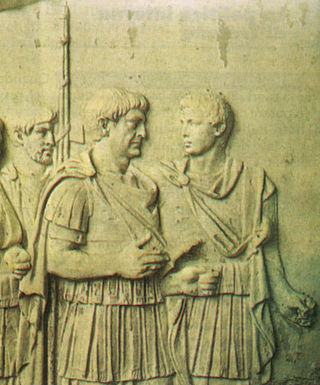Appius Junius Silanus, whom Cassius Dio calls Gaius Appius Silanus, was consul in AD 28, with Publius Silius Nerva as his colleague. He was accused of majestas, or treason, in AD 32 along with a number of senators, but he and Gaius Calvisius Sabinus were saved by one of the informers, Celsus, a tribune of a city cohort.

Lucius Licinius Sura was an influential Roman Senator from Tarraco, Hispania, a close friend of the Emperor Trajan and three times consul, in a period when three consulates were very rare for non-members of the Imperial family. The dates of two of these consulates are certain: in 102 and 107 AD he was consul ordinarius; the date of his first consulate, as a suffect consul has been debated. Fausto Zevi postulated that he was also suffect consul in 97, based on a plausible restoration of part of the Fasti Ostienses, which reads "..]us". However, two more recently recovered fragments of military diplomas show that the name of this consul is L. Pomponius Maternus, who is otherwise unknown. Most authorities have returned to endorsing C.P. Jones' surmise that Sura was consul for the first time in the year 93. He was a correspondent of Pliny the Younger.
Publius Cornelius Scipio was a Roman senator active during the Principate. He was consul in 16 BC as the colleague of Lucius Domitius Ahenobarbus. He was also proconsular governor of Asia, probably around the years 8/7 BC.
Marcus Plautius Silvanus was a Roman politician and general active during the Principate. He was consul in 2 BC as the colleague of the emperor Augustus.

Paullus Fabius Maximus was a Roman senator, active toward the end of the first century BC. He was consul in 11 BC as the colleague of Quintus Aelius Tubero, and a confidant of emperor Augustus.

The gens Vibia was a plebeian family at ancient Rome. Although individuals named Vibius appear in history during the time of the Second Punic War, no members of this gens are found at Rome until the final century of the Republic. The first of the Vibii to obtain the consulship was Gaius Vibius Pansa in 43 BC, and from then until imperial times the Vibii regularly filled the highest offices of the Roman state. The emperors Trebonianus Gallus and Volusianus each claimed descent from the family.
Lucius Valerius Messalla Volesus was a Roman senator, who flourished under the reign of Emperor Augustus. He was consul in AD 5 with Gnaeus Cornelius Cinna Magnus as his colleague. His father, Potitus Valerius Messala, was suffect consul in 28 BC and prefect of the city of Rome.
Lucius Marcius Censorinus was a consul of the Roman Republic in 39 BC, during the Second Triumvirate. He and his colleague Gaius Calvisius Sabinus had been the only two senators who tried to defend Julius Caesar when he was assassinated on the Ides of March in 44 BC, and their consulship under the triumvirate was a recognition of their loyalty.
Lucius Licinius Varro Murena was a Roman politician who was accused of conspiring against the emperor Augustus, and executed without a trial.
Publius Silius Nerva was a Roman senator and general, who flourished under the reign of Augustus. He was consul in 20 BC as the colleague of Marcus Appuleius.

Gaius Antistius Vetus was a Roman senator active during the early Roman Empire, and a consul in 6 BC as the colleague of Decimus Laelius Balbus.
Marcus Appuleius was a nephew of the Roman emperor Augustus and Roman consul in 20 BC with Publius Silius Nerva as his colleague.
Sulpicia Praetextata was an ancient Roman noblewoman who lived in the Roman Empire in the 1st century.
The gens Pasidiena, occasionally found as Passidiena, and perhaps the same as Passidinia, was an obscure plebeian family at ancient Rome. It is chiefly known from two individuals who held the consulship during the first century.
Lucius Valerius Catullus Messalinus was a Roman senator during the Flavian dynasty, and is best known as the most hated and ruthless delator or informer of his age. He was feared all the more due to his blindness.
Lucius Publilius Celsus was a Roman senator as well as a confidant of the emperor Trajan. He was consul twice: the first time as suffect consul for the nundinium of May to August 102 as the colleague of Titus Didius Secundus; the second time as ordinary consul for the year 113 with Gaius Clodius Crispinus as his colleague.
Publius Silius was a Roman senator active during the reign of the emperor Augustus. He was suffect consul in AD 3, replacing Lucius Aelius Lamia; his colleague was Lucius Volusius Saturninus.
Gaius Vibius Postumus was a Roman senator, who flourished under the reign of Augustus. He was suffect consul for the latter half of AD 5 with Gaius Ateius Capito as his colleague. Ronald Syme identifies him as a novus homo from Lavinum in Apulia. His brother Aulus Vibius Habitus was suffect consul in the latter half of AD 8.
Gaius Vibius Rufus was a Roman senator and orator, who flourished during the Principate. He was suffect consul in the second half of AD 16 with Gaius Pomponius Graecinus as his colleague. The first of his family to achieve consular rank, Rufus was a homo novus, one of ten in the first five years of the reign of Tiberius.
The gens Silia was a plebeian family at ancient Rome. Members of this gens are mentioned as early as the fifth century BC, but first to hold the consulship was Publius Silius Nerva, in the time of Augustus. The Silii remained prominent until the time of the Severan dynasty, in the early third century.